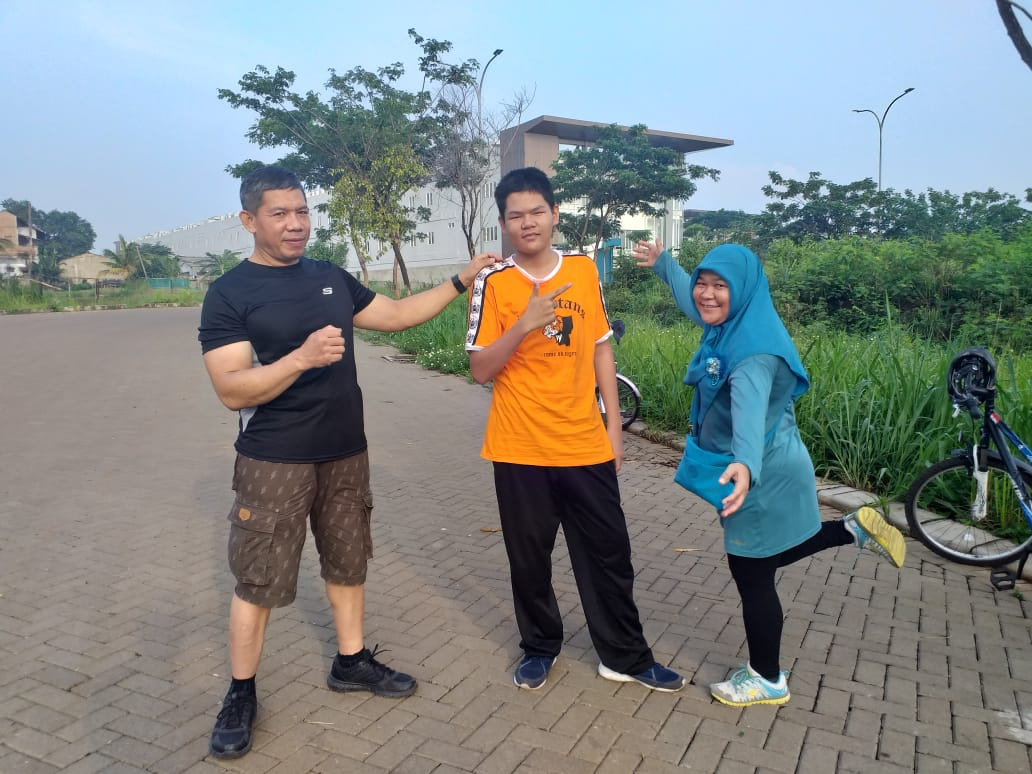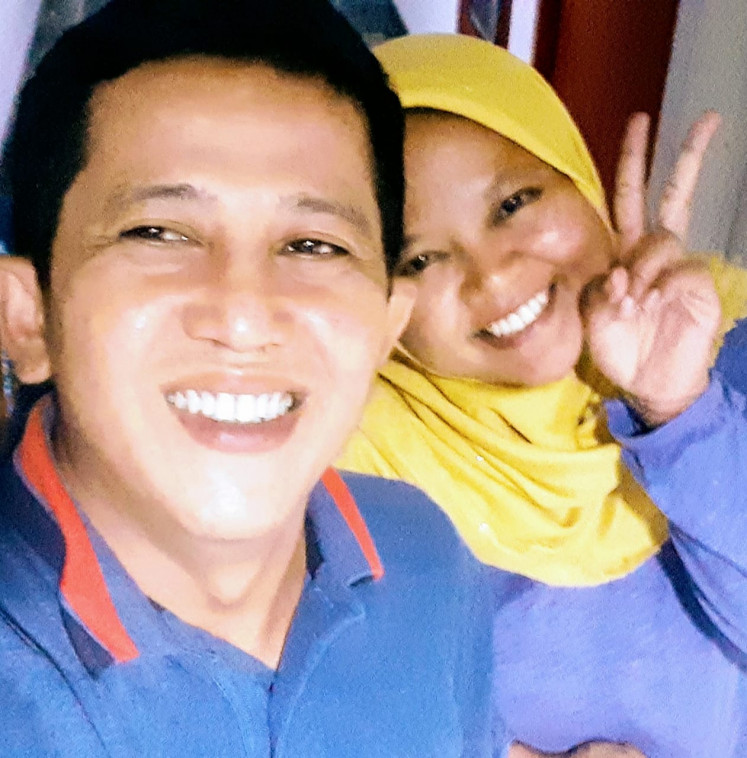Popular Reads
Top Results
Can't find what you're looking for?
View all search resultsPopular Reads
Top Results
Can't find what you're looking for?
View all search results'I lost him too fast': Families mourn loss of nurses from COVID-19
As the world commemorates International Nurses Day on Tuesday, relatives and the next of kin of frontline medical workers have yet to receive compensation and wider support from the government.
Change text size
Gift Premium Articles
to Anyone
A
ry Suryanti, 44, held onto Sugiharto’s hand as they entered the emergency room of Gatot Subroto Army Hospital at around 2 a.m. on April 1. Over the span of their 15 years of marriage, the two nurses had seen and handled all sorts of health emergency situations.
They knew, however, that this one was different.
Sugiharto had developed a cough after his last shift ended two days prior, and from there his condition continued to worsen. As time passed, even Ary could see that breathing was becoming increasingly difficult for him.
As the medical workers in hazmat suits began checking on him and prepared him for transfer to the intensive care unit (ICU), Sugiharto clenched his wife’s hand and signaled for her to come closer.
“Bu,” he whispered.
“Take care of Damar for me.”
Ary nodded and whispered back a prayer into his ear, knowing in the depths of her heart that she had to muster a lot of courage to speak to their 14-year-old son very soon.
Those were Sugiharto’s last words to Ary. That night at around 8 p.m., he passed away due to a COVID-19 infection.
"It happened so fast, I lost him too fast. Sometimes I still wait for him to come back home; I still imagine that he’s on his night shift and will return in the morning,” Ary said over the phone, weeping. “But then I realize that he is really gone. He really is no longer here and I miss him so much.”
Sugiharto was a nurse at Gatot Subroto Army Hospital (RSPAD), one of the main referral hospitals for COVID-19 patients in Jakarta.
On that fateful day, the hospital and the community where the couple lived mourned the loss of a man they knew to be a hard-working nurse and helpful neighbor.
Read also: The faces behind the numbers: Remembering COVID-19 victims
But Ary, who had lost her husband and best friend, was unable to process her feelings.
“I didn’t really have time to properly grieve because Damar and I had to self-isolate immediately after his funeral,” Ary told The Jakarta Post on Monday.
And even after a spell at home and their test results coming back negative, Ary quickly learned that the clinic where she worked for the past 20 years had asked her to continue to stay at home without as much as a hint of when she may come back to work.
Last Friday, May 1 was supposed to be Sugiharto’s 50th birthday. Ary bought the black forest cake that he loved and celebrated the special day with Damar in their living room, praying.
“I want to continue on living my life and raise my son because that is what my husband would have wanted me to do,” she said.
Without her husband and her job, Ary and Damar now live in their house in Sawangan, West Java and rely completely on the help of activists and organizations.
The government’s lack of transparency on COVID-19 cases has made it challenging to find data on the number of health workers who had died of complications from the disease in Indonesia.
Read also: COVID-19 pandemic exposes problems in our health care, Jokowi says
As the world commemorates International Nurses Day on May 12, the International Council of Nurses (ICN) has called on governments to reveal data on health care workers’ infection rates and deaths.
According to ICN’s figures, at least 90,000 healthcare workers have been infected by the coronavirus disease and more than 260 nurses have died around the world.
In a press statement from April 6, the organization said the failure by governments to record the infection rates and deaths of men and women on the frontline constitutes “a scandal” that puts all hospital staffers at a higher risk of transmission and, more importantly, undervalues the true scale of the problem.
“When the history of the 2020 pandemic is written, we will make sure that the names of the nurses who gave their lives are recorded and honored, so that their sacrifice is never forgotten,” ICN CEO Howard Catton said. “And if governments still fail to act, we will make sure that when the post COVID-19 inquiries take place, as they inevitably will, political leaders will be asked why that information was not collected.”
Read also: Nurses Day: Awareness still low of grueling, noble profession
Nationally, Amnesty International Indonesia (AII) revealed that 59 health workers, including 38 doctors and 21 nurses, had succumbed to COVID-19 as of Monday.
AII director Usman Hamid said many medical personnel were struggling to get proper protection two months after the first case was reported in early March.
Health workers in a private hospital in Banten, West Java have, for instance, reported that they only get an allotment of one mask per week despite the long hours and intense workload.
"Public health is at stake if the protections and guarantees on their right to health have yet to be fulfilled,” Usman said on Monday.
Nurses working on the frontline of COVID-19 response are prone and exposed to hazards that put them at risk of infection. This may include exposure to pathogens, fatigue from working long hours, psychological distress, occupational burnout, social stigma and physical and psychological violence.
Read also: `I'm never going to be the same': Medics grapple with mental trauma on COVID-19 front line
The chairman of the Indonesian Nurses Association (PPNI), Harif Fadhillah, said nurses in some hospitals had also begun to report fears of losing their jobs as private hospitals moved to furlough them or reduce the length of their shifts due a loss of revenue from the viral outbreak.
“We try to advocate for these kinds of cases to [...] to the Manpower Ministry. Hospitals can’t act so arbitrarily,” he said.
Harif also urged the government to review plans to ease restrictions in the midst of an uptick in COVID-19 cases.
“We saw some of the highest increases in confirmed cases in the country these past few days, which means we have more cases each day,” he said recently. “The more cases we have, it is the medical workers that must work even harder.”
Two peas in a pod: Nurse Syahrul Rahmadi (left) poses with his late wife, Ninuk, in this photo from their personal collection. In March, Ninuk was the first nurse to die in Indonesia of COVID-19, after treating patients at the Cipto Mangunkusumo Hospital in Jakarta. (Courtesy of/Syahrul Rahmadi)Meanwhile, it has been two months since Syahrul Rahmadi, 36, lost Ninuk, his wife and the mother of his two children, to COVID-19. The 37-year-old was the first nurse to die of the disease in Indonesia, having worked at Jakarta’s Cipto Mangunkusumo Hospital (RSCM).
Neither Syahrul nor Ary have received compensation from the government.
“We heard that they would help us but so far I’ve only received help from activists and organizations,” Syahrul said.
“We have a WhatsApp [...] support group for the families of nurses who passed away while tending to COVID-19 patients. There are around 15 families in that group chat and none of us have received help from the government.”
Much like Ary’s case, Syahrul was also asked to shelter at home when his company found out that his late wife suffered from the disease. It was initially promised that he would be able to return to work in May but had yet to be contacted by his employer.
President Joko “Jokowi” Widodo recently said the government would provide Rp 15 million (US$886.79) in incentives to medical specialists, Rp 10 million to physicians and dentists, Rp 7.5 million to nurses and Rp 5 million to other medical staffers, as well as a total of Rp 300 million in compensation in the case of a death.
The regulation stipulates, however, that the government will provide incentives and compensation only to medical workers who are employed at health facilities that accept referrals of COVID-19 cases. RSCM, where Ninuk worked, was not among those referral hospitals.
Read also: 'Why are we being treated like this?': Nurses handling COVID-19 evicted as landlord fears infection
Indonesian Medical Association (IDI) spokesperson Halik Malik said the group hoped the government would be more serious in planning sustainable protections for health workers, by using real time data collections from every health facility so that medical equipment was sent to the right people.
“What we want is not compensation over our deaths. We want to be appreciated by affording us proper protection,” Halik said.











